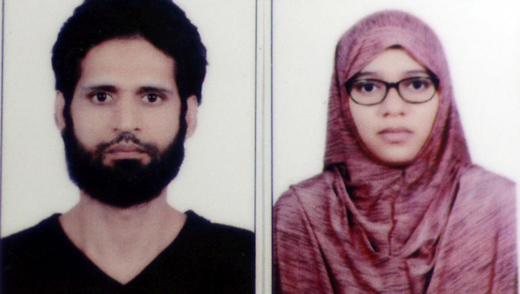Kasaragod, Jul 10: Five of the 15 missing Muslims from Kerala who are feared to have joined the Islamic State (IS) were Hindus and Christians who had converted to Islam about a year ago.

Fathima Nimisha who went missing with her husband Eesa who were feared to have joined in IS terror group
Meanwhile, intelligence sources said one of those missing was in Afghanistan, while another was hiding in India.
Among the five married couples who are missing, two were earlier Hindus or Christians.
— Nimisha, alias Fathima, from a Hindu family in Thiruvananthapuram, converted to Islam while studying at a dental college in Kasaragod district in November last year.
— Merlin, alias Mariyam, from Kochi was a Christian who converted to Islam while working with IBM in Mumbai last year.
— Nimisha and Merlin were married to two brothers, Issa and Yahiya, from Palakkad who had both converted from Christianity to Islam. Their father, Vincent, filed a missing person's complaint on Saturday.
— Sonia, alias Ayisha, an engineering graduate — who is missing with her husband Abdul Rasheed, an engineer, and their two-year-old daughter Sara — was a Christian who converted to Islam about a year ago.
Nimisha's mother, Bindu, said her daughter first went missing from her college last November. After she filed a police complaint, Nimisha and Issa appeared before a local court. “I was shocked to see her covering her face. I was told that she had been converted to Islam by some Mujahideen group,'' she said.
Nimisha's family moved a habeas corpus petition in the high court in November. But the court allowed her to live with Issa. “I asked my daughter how she met Issa as he was not her classmate or friend. I was told that her seniors in college arranged the match, that they wanted a converted youth to marry a converted girl. They had become friends just four days before they started living together,'' she said.
At first, Nimisha did not contact her family. But she later got in touch, and even visited her mother in the second week of May. “After spending a few hours with the family, she left for Palakkad. Later, I was told that they were going to Sri Lanka to explore some business opportunities. I pleaded with Issa not to go there with my pregnant daughter, but he refused to listen. After reaching Sri Lanka, she sent me WhatsApp messages,'' said Bindu.
Jacob, the father of another missing woman, Merlin, said his daughter and Yahiya had studied together in a school in Kochi. “After graduation, my daughter got a job with IBM in Mumbai. During college, she was not in touch with Yahiya, who was then a Christian. Last year, after converting to Islam, he managed to track down her in Mumbai and converted her also,'' he said.
He said Merlin told him that they were going to Sri Lanka to address religious gatherings. “We discouraged them from going to Lanka. She was a brilliant girl. We thought she would not fall into any trap. We had warned her about this relationship. She was brainwashed. For the last three weeks, we have received no information about her,'' he said.
Sonia, whose family is from Vyttila in Kochi, was born in Bahrain, where her parents were employed. She came to Kerala for her engineering studies, during which she met Abdul Rashid, a resident of Kasaragod.
According to sources, Sonia was not in touch with her family after she converted to Islam. Intelligence sources said Sonia had become a preacher, while Rashid is suspected to be the local organiser of the missing group from Kasaragod.
Meanwhile, at Padanna in Kasaragod, two brothers, Dr Ijas and Shihab, an engineer, and their wives are among those missing. Their father, Abdul Rahim, told the media that if they had joined the Islamic State he would “consider them as dead”.
Two other families in Kasaragod also filed missing complaints after their sons, who were working in Qatar and Abu Dhabi, failed to reach home. Police said the youths had called up their families on June 9, informing them that would reach home in a week. “The families expected that they would come for Eid last week. The reports about missing men made them worried. Hence, they filed complaints today,'' said police sources.




Comments
The plot thickens.....
ALL is now understood.........................................................................BJP= high rise in scams and problems . violence and trouble in cabinet reshuffling.......Dr.Zakir Naik issue (which was unnecessary link)
in KERALA people are more attracted to ISLAM.......So ISIS issue ...that too New Muslims
Ha Ha ....
Dear Yogesh,
Study ISLAM, you will understand the media twist... Dont live as per media instruction ... sometimes verify and use your intellect.
Also Ponder on NA TASYA PRATIMA ASTI>..
It clearly understood that RSS people with the help of Israel making all these controversies to avoid people from converting to Islam.
Dear Yogesh,
There are thousand of people from both the sex are converting to Islam, after they fully study it.
Then these highly educated people really work as propagators than the initially borned Muslims.
You should compare how many of them have joined IS or became terrorists. In contrary those people worked as the peace propagators than anybody.
So your addressing of these 15 Keralite have not studied Islam well.
Unfortunately the young brain have been mislead to join IS which is not at all portraying ISLAMIC values. In contrary IS is the enemy of Islam and enemy of all peace loving community.
Add new comment